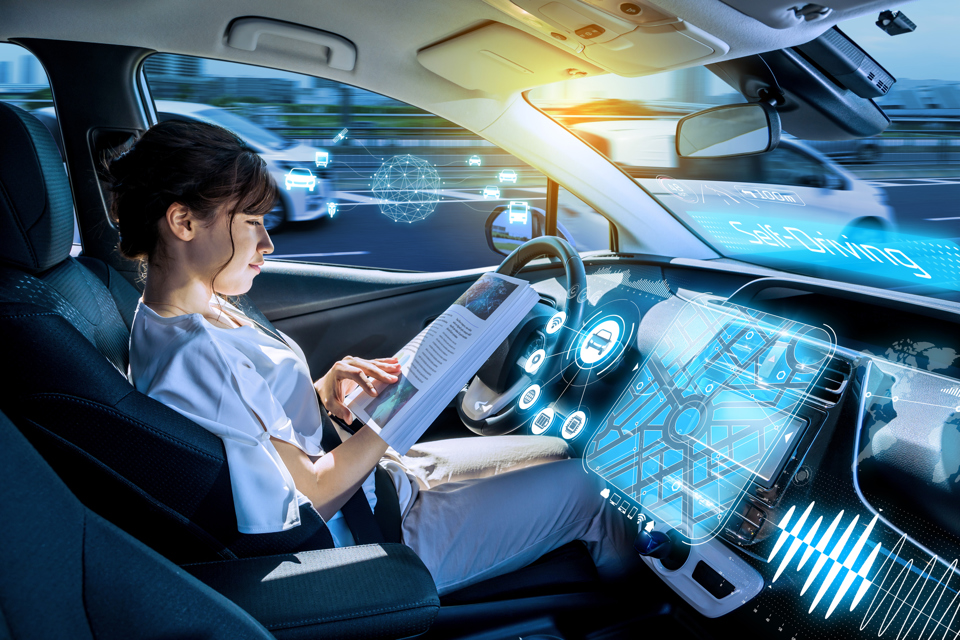The date that driverless cars are expected on UK roads has been put back, with Government approval for the self-driving technology now not expected until 2027.
The previous administration claimed that driverless cars could be on British roads by 2026, after its Automated Vehicles (AV) Act became law last year.
Originally announced in the King’s Speech in November 2023, the new law aimed to put Britain at the forefront of self-driving technology regulation.
The Act delivered a legal framework, setting out who is liable for autonomous vehicles (AVs), meaning that drivers can be assured that while their vehicle is in self-driving mode, they will not be held responsible for how the vehicle drives, but secondary legislation is required to allow driverless cars.
Limited self-driving technology is already permitted on UK roads, but a driver must be at the wheel and responsible for the vehicle, even if automated technology is being used.
The Department for Transport (DfT) told the BBC it was working “quickly” to make driverless vehicles a reality on the country’s roads and will implement self-driving vehicle legislation in the “second half of 2027”.
“We are also exploring options for short-term trials and pilots to create the right conditions for a thriving self-driving sector,” a DfT spokesperson added.
A number of firms are already trialling advanced self-driving technology on British roads, including UK technology company Wayve, while Uber says it is ready to launch its driverless ‘robotaxis’ in the UK, which are already available in the US.
Tesla has also been demonstrating its full self-driving feature in Europe with the Model 3, successfully navigating 12 lanes of traffic around the Arc de Triomphe in Paris.
Tesla told Fleet News that it does not have a timeline for when this will come to the UK.
“Tesla is currently working with regulators to receive approval for full self-driving (supervised) in Europe, aiming to launch the feature on existing and new vehicles as quickly as possible,” a spokesperson added.
The technology is already available in the US, Canada, Mexico and China.
Dr Saber Fallah, Ppofessor of safe AI and autonomy at the University of Surrey, said: “The UK’s cautious approach in the rollout of self-driving vehicles is not only appropriate but necessary for ensuring public trust and long-term safety.
“While the maturity of certain technologies, such as those proposed by Uber, is advancing rapidly, readiness must be judged not just on how well the technology performs in ideal conditions, but also on how consistently and reliably it makes decisions in complex real-world environments.
“The fundamental challenge lies in bridging the gap between statistical learning and human-level reasoning.
“Current autonomous vehicle systems often lack the capacity to explain their decisions, adapt meaningfully to unique scenarios, or respond with the nuanced judgement that human drivers routinely demonstrate.”
He explained: “True readiness requires systems that offer traceable reasoning, safety assurance, and hybrid validation (formal and simulation-based) under diverse conditions.
“Legally and ethically, certifying decision-making processes that remain unclear to regulators poses significant risks. There are also infrastructure gaps, particularly in digital connectivity and scenario testing.
“Compared to the US and China, the UK’s strategy places greater emphasis on assurance and regulation - this is a strength if paired with innovation in AI transparency and human oversight.
“Achieving this balance is key to ensuring the public sees AVs not as experimental novelties, but as trusted, competent partners in mobility.”
Professor Siddartha Khastgir, head of safe autonomy at WMG at the University of Warwick, believes that the new date for self-driving vehicles is the “correct approach” to ensure the safety of the technology and the public.
“Any policy decision, especially for emerging technologies like self-driving vehicles, must be made by gathering and using scientific evidence,” he said.
“While we are glad to see that many international self-driving developers would like to deploy their products in the UK, the recent technology recalls in the US and China are a testimony to the fact that we are still learning.
“More needs to be done before we can introduce the technology on our roads.’’
General Motors (GM) scrapped plans to develop a self-driving taxi business at the end of last year, restructuring its approach to the development of advanced driver assistance systems.
GM, which owned 90% of the Cruise autonomous vehicle business, announced it was folding the company into its wider ADAS strategy.
It said the decision was due to “the considerable time and resources that would be needed to scale the business, along with an increasingly competitive robotaxi market”.























Login to comment
Comments
No comments have been made yet.